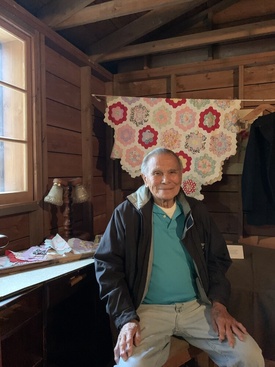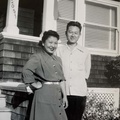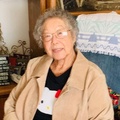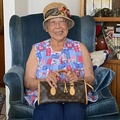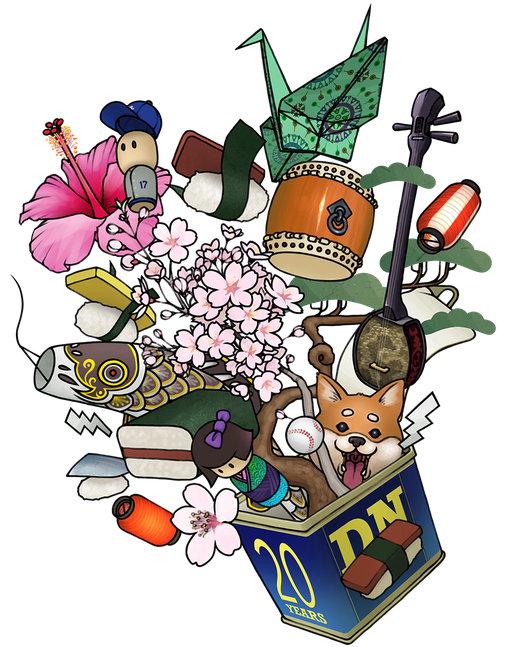How did you meet your wife?
Well, I was in the army, so I went to a USO dance. That’s where I met her.
So she’s Japanese American?
Yeah. And that’s another story. I wanted to get married, but I was only 20 years old. And so I asked my parents if they would give me permission to get married. She said, no, I was too young. And so, me and my girlfriend hop on a plane, went to Reno and got married in Reno. And I came back and then my mother-in-law says, “I would like you to get married in the Buddhist church.” Because she was Buddhist and I said “I’m not Buddhist.” She said that she didn’t care. She wanted her daughter to do this so I had to get married again in a Buddhist church. I didn’t know what the things, different sequence of events of the Buddhist church. So when it came to the part of the incense burning, I didn’t know what to do, you know? And so my wife says, “Do what you do at a funeral” [laughs].
So we got married twice, once in Reno and once in a Buddhist church. And when I got married the second time with my Caucasian wife, had to get married twice, too. Yeah. So I’ve been married twice but I got married four times.
So your first wife, how long were you married?
25 years. And she had a stroke. Yeah, at a very young age. Only 48. So I became a widower at 46. After 25 years.
And what was her name?
Yoneko.
MS (Michael Sera): But you had three boys with her.
Yeah. That’s another story. My three boys? They’re all born in September, within a week. My first son was born on September 5th. The middle son was born on September 9th. My youngest son was born on September 6th. So I used to brag I said, “Hey not bad for family planning, huh?” And then my family shot me down. They said that wasn’t family planning. That was holiday celebrating [laughs].
So jumping ahead a little bit to your MIS experience, what did you actually end up doing through the MIS and after the language school?
Like I said, I couldn’t go overseas for like three years until I got my clearance. Because I had moved around all the camps in Japan, so it took a while before I got my interim secret. And when I got that, I was able to go to Japan. But while I was waiting for a ship to go to Japan, the Korean War broke out. I thought, uh oh, because they were taking everybody in the camp to go to Korea. It was bad.
But there was 16 of us on that ship. I couldn’t understand why, but he says, “Your orders came from Washington, D.C.,” because we were military intelligence so they couldn’t they couldn’t take us and just change us to infantry people. So the ship got to Japan. 16 of us got off and got on the bus and went to Tokyo and the rest of the guys went and got their fighting equipment and came back on the ship and went to Korea. It was right after the war started and the Americans were getting killed. The odds were like 30 to 1. So everybody that was born overseas at that time went to war except 16 of us. And fortunately I got stationed in Tokyo at the military intelligence headquarters.
MS: How long were you in Tokyo?
About a year, year and a half. And then it’s time for me to go home.
And what did you do in Tokyo like at that time?
I was working in the research and development place for military intelligence. I wasn’t doing the language work. My Japanese wasn’t good enough to go to MacArthur’s headquarters and translate for him. I couldn’t translate anyway. Couldn’t read.
You were married now, right?
Yeah. She was in Monterey.
Did your parents still work at this time?
My Dad was, he would help gardening. I’m not sure what my Mom was doing but they’re doing something.
And what did you end up doing after? Were you actually out of the service by then?
No. I spent 20 years in the military. Yeah, I was in military intelligence and then I came back and I went back again. And then when I came back the second time, I wanted to get me some technical, so I applied for technical school. I went to a technical school in New Jersey in communications and got sent to Georgia after that. I was a microwave technician with big dishes and stuff. And that was the only unit in the United States Army that had [it]. And so no matter where you went to re-enlist, you could go back to California and re-enlist, you get sent back to Georgia. So I said, I don’t want to come back. Two years in Georgia was enough. So I got out of the Army, actually, and I came back to Monterey and couldn’t find a job so I went to San Jose. I got a job at Sylvania.
But the thing of it was, I had spent 13 years in the arm by then. And I was working with a bunch of retired Navy people and they kept telling me, you’re crazy because seven more years, you could get a lifetime retirement, you know? So before my one year was up, I went over to the Air Force recruiter and asked him if I could join the Air Force. And they said, yeah, you could join at the same rank with those same seniority. So I spent seven years in the Air Force [radio communications] and retired.
I wanted to ask you about when you received redress and the apology.
I was really happy to get the money which went into a new kitchen. But I was upset because my wife went to camp, but she was already dead, so you know. Anybody that was passed away didn’t get any money.
And your parents?
My parents were gone. But other than that I was happy it came. That letter of apology I thought was a joke. I told my wife, “I’m going to put this in a frame and hang it in my bathroom so every time I’m in the bathroom, I could look at the letter and think” [laughs].
And why did you think that? Specifically with the letter?
Well, you know they said they’re sorry that it happened and shouldn’t have happened. But it did happen. But it wasn’t his [President Bush’s] fault. So many years after.
Did your parents ever talk about this experience with you as you were older? Did you ever get to talk to them about what they felt about the war?
I never asked them, but no. My Dad didn’t say very much anyway.
And how old was he when he passed away?
My Dad was 76 and my Mom was 71. He had a thing for uniforms ’cause he was so proud in Japan, when I would go visit him, I’d be in my uniform. He would be the proud father, you know. He’d take me around say, “This is my son.” I don’t know what the Japanese thought about it, you know.
But he was proud of you.
Yeah, he was proud of me being in the army. So, that was nice.
Richard, is there anything else you want to add to the story? And is there any kind of lesson that you hope people take from what happened to the Japanese Americans?
Well, I would hope that this wouldn’t happen again. You know, people get all this turmoil and upheaval from what we went through. And the closest thing now is the immigrants, you know. And they’re putting them in camps. And so I have my badge. And I told you that I have my picture on the other side of my badge and it says “never again.” If people say why, I said, well, they’re trying to do that to the Muslims, you know, put them in camps, too. And I said, I know what the camps are like. They need to think twice before they put people in camps again. Like I said, all in all, I have a, I guess a happy outlook in life. So none of those problems seem to faze me. I look back and I did have a lot of experiences, but I’m not a bitter person like some people are ’cause it doesn’t help. But I try to tell people about the camps, anybody that would listen to me.
A lot of people, like I said, didn’t even know that we went to camp. They see my picture and they say, “What’s that?” Well, that’s my picture when I was in a concentration camp. They said, “What concentration camp?” Other than that, everything’s been fine. I’ve lived a good, healthy, happy life with the few ups and downs, which is normal in life. I think the biggest downer was when my wife passed away.
Of course.
And that was hard for me to take. But again, I have a second chance. Before I got married, I thought it’s only proper for me to go and ask her Dad if I could marry his daughter, because they’re Caucasians, right? And I said I don’t know how he felt about interracial marriage. So I went over and asked them if I could marry his daughter and he was really happy. He was such a good guy. And her mother was so nice to me.
That’s amazing.
And this is the first interracial marriage, too in the family. So I had to ask to make sure. But I couldn’t believe how happy he was. He’s always told my wife he says, “How come you got so lucky, you got Richard?” She said, “Dad! I’m your daughter. How come he’s so lucky he got me?” But he used to treat me so good. Just like a son.
* This article was originally published on Tessaku on February 26, 2020. It was made possible by the Japanese American Museum of San Jose and a grant from the California Civil Liberties Program.
© 2020 Emiko Tsuchida


